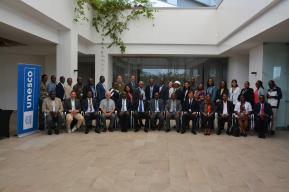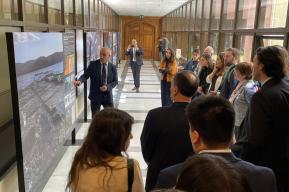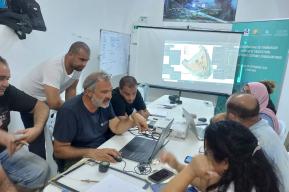News
UNESCO organizes workshop to enhance the protection of West Africa's underwater cultural heritage

Abdourahamane Diallo, UNESCO Representative to Ghana, emphasized the importance of the workshop and Ghana’s commitment to heritage preservation. He congratulated the progress made by Ghana in this field and referenced the accompanying efforts by UNESCO. “We seek to assist Ghana in formulating a strategic plan for safeguarding its underwater heritage while promoting international cooperation in accordance with the relevant Conventions, especially the UNESCO 2001 Convention on the Protection of the Underwater Cultural Heritage.”
Over 50 participants joined the dynamic workshop consisting of training sessions and discussions. Through the plenary sessions, step-out sessions on research, legal provisions and capacity-building, they learned about the significance of underwater and costal heritage, and its link to historical identity of West Africa. The participants also discussed the ways to respond to the threats faced by underwater cultural heritage in the country and the region beyond, such as treasure hunting, industrial work and climate change.
Ghana's coastline along the Gulf of Guinea has been a hub of maritime trade and activities for centuries. Among the trove of historical and cultural treasures submerged beneath its waters, many forts and shipwrecks date thus back to colonial times, the transatlantic slave trade, or earlier periods of trade and exploration. Its research thus contributes to a broader understanding of West Africa's historical connections with the wider world, particularly through its involvement in transatlantic trade and cultural exchanges.
Honorable Mark Okraku-Mantey, Ghana's Deputy Minister for Tourism, Arts, and Culture, said “We are glad to advance in the protection of the submerged sites in our country. They possess a great potential to enrich our knowledge of our region’s past”.
Government representatives gained insights into policy and legal frameworks, while the heritage experts and researchers learned more about preservation techniques. Civil Society Organizations aimed to interact with them to be empowered to raise awareness and advocate for the protection of underwater cultural heritage.
Emmanuel Odekanyin, underwater archaeologist and advising expert from Nigeria, said: “Together with Ghana, the region starts to dive into the depths of knowledge. We will work not only to educate stakeholders and the public about the significance of West Africa’s underwater cultural heritage, but also ensure that our capacity-building efforts equip us with the skills needed to safeguard and celebrate these submerged cultural treasures effectively."
The UNESCO Convention on the Protection of the Underwater Cultural Heritage provides a legal framework for State Parties to cooperate in protecting their underwater cultural heritage and preventing illicit activities. The Convention also highlights the cultural and historical role of underwater heritage in shaping the identity of countries and enriching our understanding of the past. As a party to the UNESCO Underwater Cultural Heritage Convention, Ghana has been a part of the global efforts to protect and preserve underwater cultural heritage.





